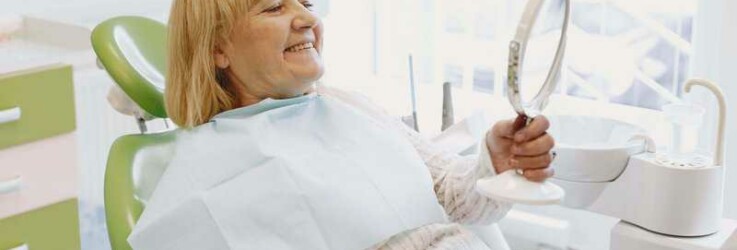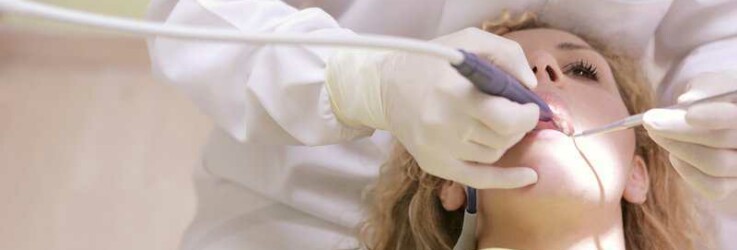Blog
What Your Gum Measurements Say About Your Oral Health

When it comes to oral health, we focus on the state of our teeth – brushing, flossing, and visiting your dentist in Douglasville regularly. However, another crucial aspect of oral hygiene that deserves attention is the health of our gums. Dentists use specific measurements to assess the condition of your gums, providing valuable insights into your overall oral health. Let’s delve into what these measurements mean and why they are essential for maintaining a healthy smile.
Understanding Periodontal Health
The health of your gums is a key indicator of your overall oral health. Periodontal health refers to the condition of the supporting structures around your teeth, including the gums, periodontal ligament, and bone. Periodontal diseases, such as gingivitis and periodontitis, can have a significant impact on these structures.
Gingival Measurements
Dentists use a periodontal probe to measure the depth of spaces, or pockets, between your teeth and gums. This measurement is called probing depth and is a crucial factor in assessing gingival health. Healthy gums typically have shallow pockets, while deeper pockets may indicate gum disease.
- Normal Pocket Depth
Healthy gums usually have pocket depths of 1 to 3 millimeters. This range suggests that the gums are firmly attached to the teeth and provide effective protection against bacteria.
- Increased Pocket Depth
Pockets measuring 4 millimeters or more may indicate the presence of gingivitis or periodontitis. Deeper pockets allow bacteria to accumulate, leading to inflammation and potential damage to the supporting structures.
- Bleeding When Probing
Bleeding during probing is a sign of inflammation and is commonly associated with gingivitis. It indicates that the gums are reacting to the presence of bacteria, and early intervention is crucial to prevent the progression of the disease.
Periodontal Charting
Your dentist in Douglasville will use a periodontal chart to record these measurements and track changes in your gum health over time. Regular periodontal charting is a valuable tool for monitoring and managing gum diseases. It helps dentists identify areas of concern, track the effectiveness of treatment, and make informed decisions about oral care.
The Importance of Gum Health
- Preventing Gum Disease
Regular monitoring of gum measurements allows for early detection of gingivitis and periodontitis. Timely intervention, such as professional cleanings and improved oral hygiene practices, can prevent the progression of gum disease.
- Preserving Tooth Support
Healthy gums are crucial for supporting your teeth. As gum disease advances, it can lead to the destruction of the bone and connective tissues that support your teeth, potentially resulting in tooth loss
- Systemic Health Connection
Research suggests a link between gum health and overall systemic health. Chronic inflammation from gum disease may contribute to the development of other health conditions, such as cardiovascular disease and diabetes.
Paying attention to the measurements of your gums is paramount to protecting your teeth and overall oral health. These measurements serve as a window into the state of your gum health, providing valuable information about the condition of your gums and the potential presence of gum disease. Regular dental check-ups, professional cleanings, and a diligent oral hygiene routine are essential components of maintaining healthy gums. By understanding and monitoring your gum measurements, you can take proactive steps to preserve your oral health and contribute to your overall well-being. Remember, a healthy smile starts with healthy gums!
4 Oral Health Things To Keep In Mind As We Age

As we journey through life, we all hope to maintain our radiant smiles and strong teeth. But the reality is that oral health can change as we age, and more often than not, we need extra support from our trusted dentist in Douglasville to keep our smiles in tip-top shape. So let’s explore some essential considerations for maintaining your oral health as you age, helping you make the most of your dental visits while safeguarding your overall well-being.
- Gum Disease: A Common Concern for Seniors
One of the critical issues to keep in mind as we age is the increased prevalence of gum disease among seniors. Gum disease, also known as periodontal disease, is a bacterial infection that can lead to severe health complications. It starts with inflammation in the gums and can progress to affect various parts of your mouth and face. In some cases, the infection may even spread to other tissues or organs, triggering additional health problems. The elderly are at a higher risk for gum disease due to several factors.
First, as we age, our immune systems tend to weaken, making it more challenging to fight off infections, including gum disease. Second, seniors may be less diligent in their oral hygiene habits, which can contribute to the development of gum disease. To mitigate these risks, it’s crucial for elderly family members and friends to schedule regular dental appointments with their dentist in Douglasville. Visiting the dentist twice a year for a thorough cleaning and examination can help detect and address any signs of gum disease early, preventing more severe complications down the road.
- Increased Risk of Tooth and Jaw Fractures
Aging is often accompanied by a decline in bone density, making seniors more susceptible to fractures, not only in their arms, legs, and hips but also in their teeth and jaws. This is a particularly important consideration as tooth and jaw fractures can have serious consequences. For many seniors, tooth loss is a common occurrence, often due to the shrinking of jawbones and other factors. When seniors are unable to bite correctly and don’t wear dentures as prescribed, their risk of experiencing a fracture increases significantly.
Fractures in the teeth or jaw can expose the affected areas to harmful bacteria, potentially leading to infections. These infections can spread rapidly and put pressure on nearby nerves, resulting in excruciating pain and discomfort. For seniors, this type of infection is especially risky as their immune systems may already be compromised by other age-related conditions, such as diabetes or heart disease. To reduce the risk of tooth and jaw fractures, it’s vital for seniors to consult their dentist for regular checkups and guidance on maintaining healthy teeth and jaws.
- The Link Between Oral Health and Whole-Body Health
It’s a common misconception that oral health is entirely unrelated to overall health. However, research suggests that the two are interconnected, with evidence pointing to a potential link between gum disease and systemic health issues. Studies have shown that gum disease may be associated with atherosclerosis in large arteries, increasing the risk of cardiovascular events such as heart attacks and strokes. This underscores the importance of regular dental checkups for seniors, as these visits can help monitor teeth for signs of decay or gum disease.
Without regular dental checkups, gum disease can progress silently, causing irreversible damage. Early detection and treatment are essential to prevent tooth loss and other dental or whole-body complications. Therefore, visiting your dentist in Douglasville at least twice a year becomes even more important, as it can help ensure your oral health is closely monitored and any issues are addressed promptly.
- The Impact of Missing Teeth on Overall Health
While not every senior will lose their teeth, it’s a relatively common occurrence. In fact, statistics show that among people aged 65 and older, 51 percent of men and 66 percent of women have lost all of their teeth. The absence of teeth can have far-reaching implications on both oral and overall health.
Seniors who are missing teeth often experience a diminished sense of taste, which can affect their enjoyment of food. Additionally, they face an increased risk of pneumonia, as the absence of teeth may make it more challenging to manage saliva and prevent aspiration of bacteria into the lungs. Furthermore, seniors with missing teeth are at a greater risk of choking on solid foods. To mitigate these concerns, there are solutions available, such as dentures, dental implants, and implant-retained dentures, which can help replace missing teeth and support overall health.
As we age, our oral health may require more attention and care. Regular dental visits with your dentist are essential for maintaining a healthy smile and safeguarding your overall well-being. By addressing issues like gum disease, the risk of tooth and jaw fractures, and missing teeth early, you can enjoy a vibrant smile and a healthier, more comfortable life as you age. Remember, oral health is intrinsically linked to your overall health, and nurturing both is key to a fulfilling and vibrant life in your golden years.
November Is TMJ Awareness Month

When we don’t feel well or are in pain, we turn to healthcare to find answers. However, sometimes symptoms don’t appear to have a direct cause, and occasionally the true problem is overshadowed by more widely recognized disorders. Temporomandibular Joint Disorder, or TMJ, is one such condition. This November, your dentist in Douglasville observes TMJ Awareness Month, a dedicated time to shed light on the challenges faced by millions of individuals battling this often misunderstood ailment.
What is TMJ?
TMJ (technically TMJ Disorder or TMD) is a complex condition that affects the temporomandibular joint, the hinge that connects the jaw to the skull. This joint plays a pivotal role in our daily lives and allows us to eat, speak, and express emotions through facial expressions. When it functions seamlessly, it goes unnoticed, but when TMJ problems arise, symptoms can be severely debilitating. Some symptoms of TMD include:
- Jaw pain
- Facial pain
- Headaches
- Difficulty chewing or speaking
- Clicking or popping sounds when opening and closing the mouth
- Jaw locking in place.
While an estimated 36 million Americans suffer from TMJ disorder and these symptoms, there is often a lack of awareness and understanding, both among the general public and within the medical community. In fact, those struggling with TMJ disorders can find themselves on a frustrating journey to find answers and get relief. The complexity of the condition, combined with the lack of awareness, often results in delayed diagnosis and inadequate treatment. Many individuals go undiagnosed or misdiagnosed for years, compounding their pain and suffering. That’s where TMJ Awareness Month comes into play.
About TMJ Awareness Month
TMJ Awareness Month aims to educate both patients and healthcare providers on the condition and help dismiss misconceptions. In fact, TMD is not just a jaw problem; it can have far-reaching effects on a person’s overall health and quality of life. According to the National Academy of Medicine report on TMJ, 30-plus health conditions can coexist with TMJ disorders such as:
- Back, neck, and joint pain
- Headaches
- Heart disease
- Hypertension
- Respiratory conditions
- Sleep disorders
- Depression, anxiety, and post-traumatic stress disorder
- Tinnitus
If you have symptoms of TMJ or other related health issues, talk to your dentist in Douglasville.
Healthcare professionals, including dentists and physicians, need to understand the importance of recognizing and addressing TMJ disorders so patients can get relief. The month of November is an opportunity for those individuals, as well as those affected by TMJ disorders, to share their stories and advocate for better research, treatment, and support. It’s time to rally for improved insurance coverage for TMJ treatments.
As we delve into TMJ Awareness Month, it’s essential to remember that awareness is just the beginning. The ultimate goal is to improve the lives of those grappling with TMJ disorders. By working together to promote awareness, advocate for better treatment, and advance research, we can make a significant difference in the lives of millions.
How to Go to the Dentist If You’re Scared

Dental anxiety is a common fear that many people experience. The mere thought of sitting in that dental chair can send shivers down your spine, making it a daunting task to schedule that long-overdue appointment with your dentist in Douglasville. However, taking care of your oral health is essential for overall well-being. The good news is that there are several strategies to help you overcome your fear and make that dental visit a much less terrifying experience.
Choose the Right Dentist
The first step in conquering your dental anxiety is finding a dentist who understands your fear and is willing to work with you. Look for a Douglasville dentist who specializes in treating anxious patients or one who has a reputation for being gentle and compassionate. Don’t be afraid to call and ask questions about their approach to patient care. A dentist who takes the time to listen to your concerns and discuss your fears will help ease your anxiety.
Communicate Your Fear
Open and honest communication with your dentist is key. Let them know about your dental fear before your appointment. This will allow them to adjust their approach and take extra steps to make you feel comfortable. Many dentists are experienced in dealing with anxious patients and can offer solutions like nitrous oxide (laughing gas) or oral sedation to help you relax during the appointment.
Bring a Support System
Having a trusted friend or family member accompany you to your dental appointment can provide emotional support and comfort. They can hold your hand, distract you with conversation, or simply be there to reassure you throughout the process. Knowing that someone you trust is by your side can significantly reduce anxiety.
Schedule Morning Appointments
If you’re anxious about your dental visit, consider scheduling your appointment for the morning. This way, you won’t spend the entire day worrying about it, and you can get over it early. Additionally, morning appointments are less likely to be delayed, reducing the time you spend in the waiting room, which can add to your anxiety
Practice Relaxation Techniques
Before heading to the dentist, practice relaxation techniques that can help calm your nerves. Deep breathing exercises, meditation, or even listening to soothing music can be effective ways to reduce anxiety. Bringing headphones and your favorite playlist to the dentist’s office can help create a more relaxed atmosphere during your appointment.
Explore Dental Sedation Options
For severe dental anxiety, dental sedation may be a viable option. Your dentist in Douglasville can discuss various sedation methods, including oral sedatives, intravenous (IV) sedation, or general anesthesia, depending on your needs and the complexity of the procedure. Sedation can make your dental visit virtually painless and anxiety-free.
Reward Yourself
After your dental appointment, reward yourself for facing your fears and taking care of your oral health. Treat yourself to something enjoyable, whether it’s a favorite meal, a new book, or some pampering. Associating positive experiences with dental visits can help reduce future anxiety.
Remember that dental anxiety is common, and many people share your fear. Dentists are trained to provide care for anxious patients, and there are numerous techniques and options available to make your dental visits more comfortable. By taking proactive steps and seeking the right support, you can conquer your dental anxiety and maintain a healthy, beautiful smile for years to come. Don’t let fear hold you back from taking care of your oral health; your teeth will thank you for it!
Good Dental Habits May Reduce the Risk of Breast Cancer

October is Breast Cancer Awareness Month, and when most people think about reducing the risk of breast cancer, they think about maintaining a healthy diet, regular exercise, and routine breast examinations. However, your dentist in Douglasville has some news about how taking care of your teeth may reduce the risk of breast cancer. In fact, recent research has suggested a strong link between oral health and breast cancer risk.
How Can Oral Health Affect Overall Health?
There’s a concept called the oral-systemic connection that has gained significant attention in the medical field in recent years. It refers to the intricate and interesting relationship between oral health and the overall health of the body. It’s no longer a secret that poor oral health can contribute to various whole-health issues, including heart disease, diabetes, and respiratory problems. Now, emerging research is shedding light on the connection between oral health and breast cancer.
The Link Between Gum Disease and Breast Cancer
One of the most compelling pieces of evidence linking oral health to breast cancer risk is the association between gum disease (periodontal disease) and breast cancer. Multiple studies have indicated that women with gum disease have a higher risk of developing breast cancer than those with healthy gums.
Researchers believe that the inflammation caused by gum disease may be a significant contributing factor. Chronic inflammation is known to play a crucial role in the development and progression of various cancers, including breast cancer. When the gums are infected and inflamed, the body’s immune response is activated, releasing inflammatory molecules into the bloodstream. These molecules can potentially reach breast tissue and promote the growth of cancer cells.
The Role of Oral Bacteria
Another intriguing aspect of the oral-breast cancer connection involves the role of specific oral bacteria. Some studies have identified certain types of bacteria that are more prevalent in the mouths of women with breast cancer. These bacteria produce enzymes that can modify estrogen, a hormone associated with breast cancer development.
Maintaining Good Dental Habits
Maintaining good dental habits is wise for various reasons, but knowing that it may help reduce the risk of breast cancer makes it crucial. Make sure you’re:
- Brushing and Flossing
Brushing your teeth twice a day and flossing daily can help keep your gums healthy and reduce the risk of gum disease and therefore the risk of cancers, including breast cancer.
- Limiting Sugar Intake
Sugary foods and drinks can contribute to tooth decay and gum disease. Reducing sugar consumption can improve your oral health and overall health.
- Quitting Smoking
Smoking is a significant risk factor for gum disease and various cancers, including breast cancer. Quitting smoking is a crucial step in improving both your oral and overall health.
- Eating a Balanced Diet
A diet rich in fruits, vegetables, and whole grains provides essential nutrients for gum health. Additionally, antioxidants found in these foods may help reduce inflammation in the body.
- Seeing Your Dentist Regularly
Visiting your dentist in Douglasville for regular checkups and cleanings is essential. Dentists can detect gum disease early and provide treatment to prevent its progression. Make sure to schedule an appointment every six months.
While more research is needed to fully understand the complex relationship between oral health and breast cancer, the evidence so far suggests that good dental habits can play a role in reducing the risk of this prevalent cancer. Taking care of your oral health by practicing good dental hygiene, visiting your dentist regularly, and making healthy lifestyle choices can contribute to a healthier overall well-being.
Essential Dental First Aid Items Every Family Should Have

Accidents can happen at any time, and dental emergencies are no exception. But having a well-equipped dental first aid kit at home can make a significant difference in handling unexpected dental issues promptly and effectively. Keep in mind that all dental emergencies should warrant a phone call to your dentist in Douglasville. However, having a specialized dental first aid kit can help you address oral health emergencies with precision before you can get in for an exam.
The Basics of a Dental First Aid Kit
- Gloves
Safety comes first. Disposable gloves ensure that you maintain proper hygiene while administering first aid.
- Gauze Pads and Cotton Balls
These are versatile tools to help stop bleeding, cushion sensitive areas, and clean wounds.
- Dental Mirror
A dental mirror helps you see those hard-to-see areas.
- Dental Floss and Floss Picks
These are essential for dislodging food particles stuck between teeth, which can cause discomfort or even infection.
- Saline Solution
This is useful for rinsing out the mouth, cleansing wounds, and soothing irritation.
- Temporary Dental Filling Material
A temporary filling can temporarily seal a cavity or a broken tooth, providing relief until you can see a dentist.
- Dental Wax
This can be used to cover sharp or jagged edges of a broken tooth, braces, or other dental appliances, preventing further irritation or injury.
- Over-the-Counter Pain Relievers
Pain can be a major concern during dental emergencies, and over-the-counter pain relievers can help. Consult a dentist or healthcare provider about which pain relievers to include in your kit.
- Clove Oil
Known for its natural numbing properties, clove oil can provide temporary relief for toothaches.
- Emergency Dental Contact Information
Keep a list of emergency dental contacts, including your dentist in Douglasville.
Addressing Common Dental Emergencies
- Toothache
A sudden toothache can be agonizing. Rinse your mouth with warm water, use dental floss to dislodge any debris, and apply a cold compress to reduce swelling. Over-the-counter pain relievers may help, but consult your dentist if the pain persists.
- Chipped or Broken Tooth
Rinse your mouth with warm water and collect any tooth fragments. If there’s bleeding, apply gauze with gentle pressure. Cover any sharp edges with dental wax and call your dentist.
- Knocked-Out Tooth
Time is critical here. Handle the tooth by its crown (top), not the roots. Rinse it gently with water and try to place it back into the socket if possible. If that’s not feasible, store it in a container with milk or saliva, and seek dental care immediately.
- Object Stuck Between Teeth
Use dental floss to gently remove the object. Never use sharp or pointed objects that could damage gums.
Every home should have a dental first aid kit. By being prepared to handle dental emergencies promptly, you can alleviate pain, prevent complications, and increase the chances of successful treatment when you’re able to reach a dentist. Remember that while a dental first aid kit is a useful tool, it’s not a substitute for professional dental care. Always consult your Douglasville dentist for proper diagnosis and treatment after administering first aid.
How Good Oral Health May Help Protect Against Alzheimer’s

Maintaining good oral health by brushing, flossing, and seeing your dentist in Douglasville has long been associated with benefits such as a bright smile and fresh breath. However, researchers have been uncovering an even bigger reason to take care of your teeth. Studies continually show a potential connection between oral health and overall well-being, particularly in relation to cognitive health. A growing body of evidence suggests that there might be a link between good oral hygiene and a reduced risk of developing Alzheimer’s disease, a debilitating neurodegenerative disorder. Let’s take a look at how taking care of your teeth and gums might play a role in safeguarding your brain health.
The Oral-Brain Connection
The mouth serves as the gateway to the body, and its health can impact various aspects of overall health, so it’s not surprising that the oral-brain connection has caught the attention of scientists. Poor oral hygiene can lead to the accumulation of harmful bacteria in the mouth, causing gum disease and other oral infections. Interestingly, these oral pathogens don’t just stay confined to the mouth – they can find their way into the bloodstream and potentially reach the brain.
Inflammation and Alzheimer’s
One of the key factors linking oral health and Alzheimer’s disease is inflammation. Chronic inflammation is believed to contribute to the development and progression of various diseases, including Alzheimer’s. Gum disease triggers an inflammatory response in the body, and if left untreated, this inflammation can spread to other parts of the body, including the brain.
Research has shown that the presence of specific oral bacteria associated with gum disease can be detected in the brains of individuals with Alzheimer’s disease. These bacteria might contribute to the formation of beta-amyloid plaques, a hallmark of Alzheimer’s, by activating the immune system and promoting inflammation in the brain. Therefore, maintaining good oral health could potentially help reduce the risk of chronic inflammation and its potential impact on brain health.
The Blood-Brain Barrier
The blood-brain barrier is a protective network of blood vessels that acts as a barrier between the bloodstream and the brain. It prevents harmful substances from entering the brain while allowing essential nutrients to pass through. However, certain infections and inflammatory responses can compromise the integrity of this barrier, potentially allowing harmful agents to reach the brain.
Oral bacteria associated with gum disease can release toxins that may weaken the blood-brain barrier. This weakening can make it easier for harmful substances to enter the brain, triggering an immune response that contributes to inflammation and damage. By maintaining good oral health, you might be able to reduce the risk of these oral bacteria infiltrating the brain and compromising the blood-brain barrier’s function.
Preventive Strategies
While research into the link between oral health and Alzheimer’s is still ongoing, there are several steps you can take to prioritize your oral hygiene and potentially support your cognitive health:
Brush & Floss Regularly: The foundation of good oral hygiene lies in regular brushing and flossing. Brush your teeth at least twice a day with fluoride toothpaste and don’t forget to floss to remove food particles and plaque from between your teeth.
Visit Your Dentist in Douglasville: Regular dental check-ups are essential for detecting and addressing any oral health issues early on. Your dentist can help you maintain healthy gums and catch any signs of gum disease.
Eat A Balanced Diet: A diet rich in fruits, vegetables, lean proteins, and whole grains can contribute to both oral and overall health. Avoid sugary snacks and beverages that can promote tooth decay.
Stay Hydrated: Drinking water helps wash away food particles and bacteria that can lead to plaque formation.
Avoid Smoking & Excessive Alcohol: Smoking and heavy alcohol consumption are linked to increased risk of gum disease and can have negative effects on oral health.
The connection between oral health and cognitive health is an exciting area of research that holds promise for our understanding of neurodegenerative diseases like Alzheimer’s. While more studies are needed to establish a definitive link between good oral hygiene and reduced Alzheimer’s risk, the existing evidence suggests that prioritizing oral health might have more far-reaching benefits than we previously imagined. By taking care of your teeth and gums, you could potentially be taking a proactive step towards protecting your brain health in the long run. So, don’t underestimate the power of a healthy smile or the importance of visits to your dentist in Douglasville – they could be a window to a healthier brain.
Is There Any Cure For Dry Mouth?

Dry mouth is a common, yet often-overlooked, condition that affects millions of people. While dry mouth may seem like no big deal, the truth is it can actually be pretty uncomfortable and could even cause some pretty serious oral health problems. If you’re looking for a cure for dry mouth, your dentist in Douglasville has some suggestions that could alleviate this annoying ailment.
What Is Dry Mouth?
Dry mouth, which is also medically known as xerostomia, is a condition that occurs when there isn’t enough saliva production in the mouth. It can happen to anyone, and while occasional dry mouth may be normal, chronic dryness can lead to a range of uncomfortable symptoms, and affect speech, eating, and even dental health.
What Causes Dry Mouth?
Numerous factors can trigger dry mouth, and understanding the root cause is crucial in determining the best, most effective treatments. Your dentist in Douglasville will evaluate you for some of the most common causes of dry mouth including:
Medications
Certain medications, such as antihistamines, antidepressants, and diuretics, are notorious for causing dry mouth as a side effect.
Medical Conditions
Dry mouth can be a symptom of underlying medical conditions like Sjögren’s syndrome, diabetes, and autoimmune disorders. By understanding the connection between these conditions and dry mouth, we can explore potential cures tailored to each situation.
Lifestyle
External factors like smoking, alcohol consumption, and breathing through the mouth can exacerbate dry mouth symptoms.
The Consequences of Untreated Dry Mouth
The impact of untreated dry mouth goes beyond mere discomfort. For example, dry mouth can have potential consequences on oral health, nutrition, and overall well-being. Understanding these implications underscores the importance of finding viable solutions.
Available Treatments for Dry Mouth
While there might not be a one-size-fits-all cure for dry mouth, various treatments can help alleviate symptoms and improve the quality of life for those affected. Talk to your dentist in Douglasville to determine the best treatment for your dry mouth.
Over-the-Counter Remedies
There’s an array of over-the-counter products specifically designed to combat dry mouth, including mouthwashes, sprays, and lozenges.
Lifestyle Changes
Embracing and making specific lifestyle changes like quitting smoking or limiting alcohol intake can also play a significant role in managing dry mouth.
Prescription Medications
For severe cases of dry mouth, prescription medications may offer more substantial relief.
Dry mouth may be an annoying challenge, but there are things you can try to help cure it. By determining the root cause, exploring available treatments, and making lifestyle changes, relief is within reach. If you or someone you know suffers from dry mouth, start by scheduling an appointment with your dentist in Douglasville.
What Are Some Side Effects Of Dental Procedures?

While dental treatments are often essential for maintaining oral health or achieving a dazzling smile, it’s important to be aware of the possible side effects associated with them. From teeth whitening to dental fillings and root canals, each procedure can come along with its own side effects. So before undergoing any dental treatment, ease your mind by talking with your dentist in Douglasville about potential side effects, what to expect after a procedure, and the best course of action for you.
Cosmetic Dentistry & Teeth Whitening
Cosmetic dentistry has gained popularity over the years, with people seeking various procedures to enhance their smiles. One of the most sought-after treatments is teeth whitening. A bright, pearly white smile can boost confidence, but what are the potential side effects of this procedure?
- Tooth Sensitivity
Teeth whitening often involves the use of bleaching agents that can penetrate the enamel to remove stains. This process can lead to temporary tooth sensitivity, where individuals experience discomfort or pain when consuming hot, cold, sweet, or acidic foods and beverages.
- Gum Irritation
In some cases, the bleaching agents used in teeth whitening can irritate the gums, causing redness and mild discomfort. However, choosing a professional whitening treatment in the comfort of your dentist’s office instead of an at-home product can help minimize the risk of gum irritation during the procedure.
Dental Fillings
Dental fillings are a common treatment for cavities, restoring the structure and function of damaged teeth. Whether you choose traditional silver amalgam fillings or modern tooth-colored fillings, both treatments can have side effects.
- Sensitivity
Patients may experience temporary tooth sensitivity after getting a filling. This sensitivity usually subsides quickly, but it’s essential to be aware of this possibility.
- Discomfort
After your dentist places a filling, they will file it down to match the size, shape, and height of the original area. However, if the filling sits too high, you may experience jaw or tooth discomfort. The solution is easy – just call your dentist in Douglasville for a quick and painless adjustment.
Root Canal Treatment
Root canal treatment is often feared but it’s a necessary procedure to save a severely damaged or infected tooth. While it’s a highly successful treatment, some side effects may occur.
- Post-Treatment Discomfort
After a root canal, patients might experience some discomfort or mild pain, which can usually be managed with over-the-counter pain relievers. This discomfort is temporary and should subside as the tooth heals.
Different dental procedures may be necessary for a variety of different concerns, and we understand that you may feel uneasy about getting treatment. However, taking care of problems early is a crucial part of maintaining oral health. We encourage you to talk with your dentist in Douglasville about the pros and cons, as well as any side effects, of any recommended treatments to ease your mind and make an informed decision.
How To Handle Dental Emergencies

Dental emergencies can occur unexpectedly, causing pain, discomfort, and anxiety. Knowing how to handle these situations promptly and effectively is crucial to minimize pain, prevent further damage, and ensure timely care. In this comprehensive guide, your dentist in Douglasville explores common dental emergencies and provides step-by-step instructions on how to handle them.
Contact Your Dentist
Different types of dental emergencies require different kinds of care, so it’s important to contact your dentist in Douglasville quickly if you experience a dental emergency so they can diagnose and properly treat your specific needs. While there are steps you can take to help reduce the risk of additional damage and temporarily relieve discomfort, you should always let your dentist know if you have a dental emergency.
Toothaches
Toothaches can pop up out of nowhere and can cause mild discomfort or even excruciating pain. Here’s what you can do:
- Rinse your mouth with warm saltwater to alleviate pain and reduce inflammation.
- Gently floss around the affected tooth to remove any trapped food particles that may be causing the pain.
- Take over-the-counter pain relievers as directed, but avoid placing aspirin directly on the tooth or gums.
- Apply a cotton ball soaked with clove oil to the area. Clove oil contains a natural anesthetic and antibacterial that helps reduce inflammation.
Knocked-Out Tooth
If a tooth gets knocked out, immediate action is crucial for the best chance of saving it:
- Handle the tooth by the crown (the top part) and avoid touching the root.
- Rinse the tooth gently with water if it’s dirty, but do not scrub or remove any attached tissues.
- Try to reinsert the tooth into its socket, making sure it’s facing the correct way. Apply gentle pressure to hold it in place.
- If you cannot reinsert the tooth, place it in a container of milk or saliva and seek dental assistance immediately. Time is of the essence when it comes to saving a knocked-out tooth.
Broken or Chipped Tooth
If you break or chip a tooth, follow these steps:
- Rinse your mouth with warm water to clean the area.
- Save any broken pieces of the tooth.
- If there’s bleeding, apply gentle pressure with a clean gauze or cloth.
- Your dentist in Douglasville will evaluate the extent of the damage and recommend the appropriate treatment, which may include dental bonding, a crown, or other restorative dentistry options.
Lost Filling or Crown
Losing a filling or crown can be uncomfortable, but temporary solutions are available:
- Clean the affected tooth and apply dental cement or temporary dental filling material, available at most pharmacies.
- Avoid chewing on the affected side until you can see your dentist for a permanent solution
Soft Tissue Injuries
Injuries to the lips, gums, cheeks, or tongue can result in bleeding and discomfort. Here’s what to do:
- Rinse your mouth with warm saltwater to clean the area.
- Apply gentle pressure with a clean gauze or cloth to control bleeding.
- If bleeding persists or the injury is severe, seek immediate medical attention or visit the emergency room.
Handling dental emergencies requires prompt action and appropriate care. By following the steps outlined in this comprehensive guide, you can effectively manage dental emergencies. However, it’s essential to remember that these steps are temporary measures, and seeking professional dental care from your dentist as soon as possible is crucial for proper diagnosis and treatment.



